You made the mistake of leaving your always-ravenous canine at home, unsupervised, with the lid loose on the dog food container. You come home to find an empty dog food bin and a bloated, uncomfortable dog who is retching non-productively. Is this the dreaded GDV (gastric dilatation and volvulus, with volvulus meaning an obstruction caused by a twisting of the stomach or intestines) or just plain ol’ food bloat (gastric dilatation)?
It can be hard to tell in this situation, so an immediate visit to the veterinarian is in order. While knowing that your pet likely ingested a large quantity of food makes gastric dilatation more likely, it is also possible your dog is suffering from GDV. Therefore, this is an emergency; taking a “wait and see” approach is not safe in this scenario.
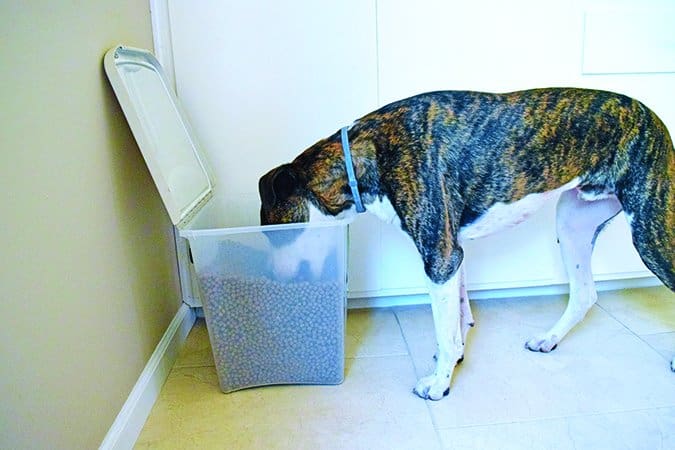
Food Bloat is Sadly All Too Common in Dogs
As an ER veterinarian, I routinely treated food bloat. The perpetrators were frequently left alone with an easily accessible, large amount of dog (or cat or goat or horse) food. Many dogs will eat until they can hold no more. Beagles and Labradors seem particularly prone to this type of scenario, as they are breeds known to rarely turn down a meal.
Kibble is the most commonly fed type of diet, and unfortunately for our dogs, once it enters the dog’s stomach, it starts absorbing stomach acid and begins to swell. The wet kibble becomes dense and heavy. While your dog may feel the urge to vomit, he may not be able to successfully retch up the mass of food. Thus, the symptoms of a food bloat: abdominal distention, drooling, discomfort, restlessness, and non-productive retching.
Dr. Catherine Ashe
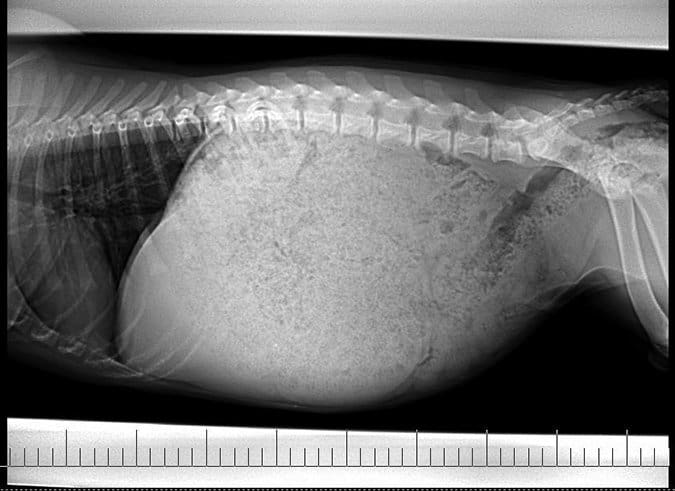
You may be wondering, “Shouldn’t I make my dog vomit if this happens?” Unless you know that the gorging happened within the last five to 10 minutes, forcing your dog to retch is unlikely to be successful. Once moisture gets into a huge amount of kibble, it becomes difficult or impossible for the dog to bring it back up; the sodden mass becomes too heavy for the muscles that, ordinarily, cause vomiting easily.
Hydrogen peroxide, once widely recommended for the induction of vomiting in dogs, has recently fallen out of favor. The use of peroxide can lead to ulcers in the mouth, esophagus, and into the upper and lower GI system. In cases of food bloat, induction of vomiting is best left to the discretion and experience of veterinary professionals, who can use an injectable medication (usually apomorphine) to quickly and more safely induce vomiting.
Food Bloat Treatment: Not as Scary as GDV Treatment
Luckily for your canine friend, food bloat is relatively simple to treat and rarely results in long-term consequences. Your veterinarian will likely x-ray your dog’s abdomen to ensure that this is just gastric dilatation and not a GDV, which calls for immediate surgery to untwist the twisted stomach and/or bowel and perhaps surgically remove damaged intestine.
The veterinarian will also likely start an IV catheter, which allows rapid administration of fluids to correct dehydration and replace electrolyte losses, and to administer medications. In the case of food bloat, if a dog has vomited repeatedly or retched up fluid, he is losing electrolytes and water. This causes dehydration, which is worsened by the stomach pulling in large amounts of fluid to soften and digest the mass of kibble.
Along with rehydration, your veterinarian may use Cerenia (an anti-emetic) to treat ongoing nausea, and sometimes metronidazole, an antibiotic that that can soothe the GI tract by decreasing inflammation. It can also help prevent diarrhea. Other treatments might include probiotics and a bland diet for several days.
Most importantly, your dog will be walked frequently. The exercise stimulates the intestines to move and helps to pass the dog food through the system quickly. Generally 12 to 24 hours in the hospital is all that’s required to help a dog feel better after over-indulging. Just remember to put the food out of reach next time!
© Ivonne Wierink | Dreamstime.com
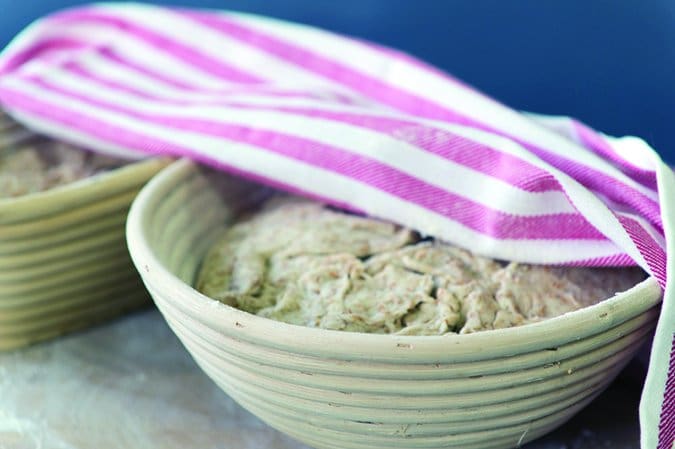
What if my Dog Gorged on Something Else?
It’s not uncommon for dogs to gorge on ANY food items when given the opportunity. As an emergency veterinarian, I’ve seen it all. Dogs like to eat corn cobs, rib bones, discarded food, even empty crab and shrimp shells. If you enjoyed eating it, your dog will likely enjoy it, too.
So what will your veterinarian do if your dog has gorged on something unusual? The quick answer is that it depends. If your pet ingested something that could be sharp or cause damage to the esophagus, the veterinarian likely will not induce vomiting. Bones, shells, and corn cobs can be highly traumatic if a dog regurgitates them. They can also cause problems such as pancreatitis, obstruction of the intestines, and perforation. In those cases, your veterinarian may recommend endoscopy to remove the items carefully and in a controlled manner or even an exploratory surgery.
danger!
Rising Bread Dough
Of special note is the danger caused by rising bread dough. Most dogs will eat rising bread left within reach; it apparently smells irresistible to dogs. This can cause symptoms of food bloat, but it is a much more serious concern.
The yeast in bread dough will continue to ferment in a warm, moist environment (like the dog’s stomach). The fermentation process yields ethanol alcohol and a rapidly growing ball of dough. Your dog will be very bloated and uncomfortable, and he may also be drunk!
Bread-dough ingestion can be very serious and requires more aggressive intervention than a standard food bloat. In some cases, the bread can double or triple in size, necessitating surgery to remove it.
Whole Dog Journal covers yeast dough in 13 Household Items Toxic to Dogs, along with twelve other common and dangerous things your dog may decide to eat.
Catherine Ashe graduated the University of Tennessee College of Veterinary Medicine in 2008. After a small-animal intensive emergency internship, she has practiced ER medicine for nine years. She is now working as a relief veterinarian in Asheville, North Carolina, and loves the GP side of medicine. In her spare time, she spends time with her family, reads voraciously, and enjoys the mountain lifestyle.


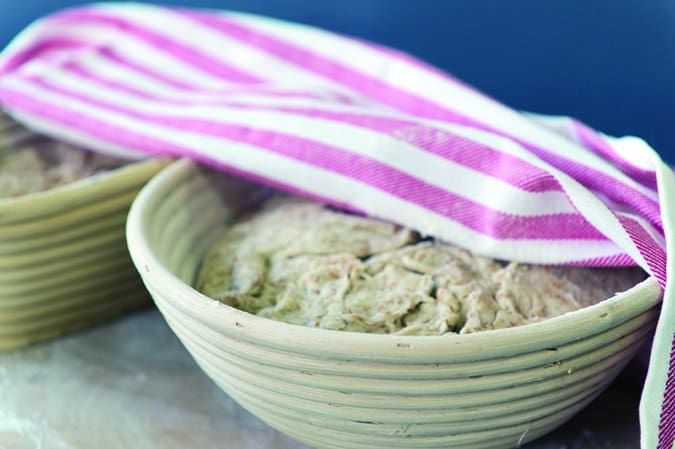


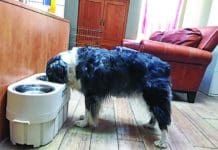

My dog is a Manchester Terrier and he’s neutered 7 yrs old. He’s had the Deairreha for a couple months now. We tried almost everything to get him back to normal again…. no luck yet … now he looks like his Stomache is swelled up he is still eating and drinking fine. Still isn’t pooping In the right form runny and some soft serve style ice cream cone form… Taking to vet tommorrow Hope they fix the problem I’m crying to much and worrying all the time. He’s my boy 🐶
My cavalier King Charles spaniel has recently developed that same issue. I took her to the vet had xrays, blood work and urine samples tested and $500 later they still have no clue. She’s not acting to be in distress at all but her belly is swollen and has clear fluid surrounding it (the vet drew some fluid out which was clear). I recently started giving her some moist food which I let the vet know but they don’t think that would be causing this issue. Either way I’m changing back to strictly dry kibble and hoping this issue goes away.
My girl is 10 and a pitbull she has been bloated and it’s moving down from a higher to lower abdomen she chuffs and will have very small bm she seems to be out of breath restless and miserable I can’t afford avet this no one will look at her because we have little of the cost ifeel so helpless if I had to guess I would say it’s the food bloat type
I know what you mean when you don’t have the money and live on a tight budget. My dog is acting miserable and restlessness and still acts like he is starving (which he isn’t) I wish I could take my dog to the vet but since I don’t have the money I say he will die on me but I’m trying everything possible to take care of him myself. I love my dog more than I do myself too!!! I wish and pray to God that I could get him help but unlikely since I don’t have the Almighty Dollars!!!!!